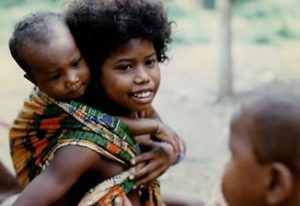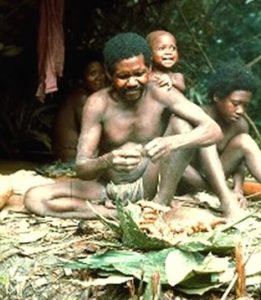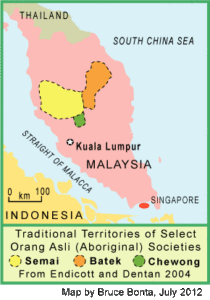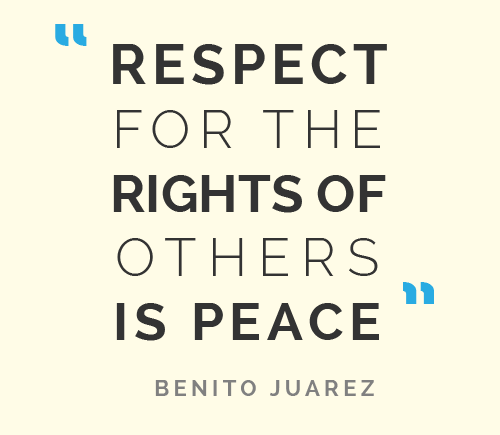Location. About 1,500 Batek, an Orang Asli society (Malay for “Original People”), live in the forests of Peninsular Malaysia, many in the Taman Negara National Park and surrounding areas.

Economy. The economy of the Batek is based on gathering, hunting, and collecting forest products for trade, with occasional crop planting on a small scale. They have no concept of land ownership—the idea is absurd to them—and natural resources in the forest cannot be owned until someone harvests them. Wild foods and forest products are available for anyone who wants to take them. People who discover resources in the forest, such as a wild fruit tree, will share the knowledge with the band with no further special rights to it. An exception might be fruits from the orchards in the river valleys, where people might resent individuals from another valley taking them.
Beliefs that Foster Peacefulness. The Batek believe that one of their diseases, ke’oy, consisting of fever, depression, shortness of breath, and weakness, is caused when someone is angry with another without justification. While there are some spells that may help, the cure for the disease is for the person who is angry to control his or her feelings so the victim can recover. The person responsible for the problem treats the victim with various folk remedies, tells the victim’s heart to be cool, blows on his or her chest for the cooling effect, and grasps and throws away the disease. This belief in ke’oy helps ensure that the Batek treat each other well, since victims receive group backing and angry people, who cause disease, may lose social support and be ostracized. Kirk Endicott delivered an engrossing analysis of the Batek as a peaceful foraging society in 2011.
Avoiding and Resolving Conflict. While they do not resolve conflicts in a formal manner, people frequently have public discussions of disputes in attempts to gain supporters for their arguments. When conflict resolution strategies fail, one of the parties to a dispute will often leave the group for a while to let feelings of anger dissipate.

Gender Relations. Men normally hunt while women gather vegetables, but both foods are valued equally and both sexes are part of the food-sharing network in their camps. Men sometimes gather vegetables, and women sometimes (though rarely) hunt—they have no rigid rules separating their sex roles. Both sexes gather the rattan that they trade for outside goods, and men and women both participate in government-sponsored agricultural activities. Marriages are based on equality, compatibility, and affection; couples make joint decisions about their activities. They normally have close, companionable relationships while they work together and enjoy their leisure time with one another. If the warmth of the relationship erodes, either spouse can divorce the other and count on the support of the band to assist with child-support and food sharing. However, the introduction of wage labor, farming activities, and guiding by Batek men, and not women, may be starting to erode their traditional gender equality in some communities.
Raising Children. Batek fathers as well as mothers spend a lot of time cuddling, holding, and talking with infants of either sex. Parents are quite relaxed about discipline: one two-year old child used a bamboo flute his father had just finished making as a hammer. The father didn’t care since he could easily make another. Parents rarely strike a child or use physical force on them, since their word sakel means both to hit and to kill, an abhorrent concept to them. Parents may discipline children by warning them about tigers, strangers, or the thunder god that punishes people who violate religious prohibitions. Children play actively but not aggressively, and they lack competitive games. According to an article published in 2014, one of the Batek child-raising strategies is to have their children carry plates of food to other families, to teach them their sharing values.
Social Practices. Their camps consist of autonomous families that share enough interests to prompt them to converge together. They schedule and informally coordinate group activities such as fishing. They discuss group issues extensively and rely on natural leaders for their experience, judgment, and advice. These leaders can only be persuasive—they have no authority. The Batek tolerate the occasional lazy individuals, since their spouses often make extra efforts as if to compensate.
Sense of Self. The Batek identify themselves as forest people; the forest is their true home. Their shelters are scattered about wherever they decide to camp, with no symbolic defenses from the forest. While the thatch is still fresh and green, it is almost impossible to see a camp from even a few feet away. They prefer the forest because it is cool and, they feel, healthier than living in the heat of the clearings. They also prefer the forest because it gives them a refuge from other people.
Sharing. The Batek have a firm expectation that all food, including game that is killed and vegetables that are gathered, will be shared. When different groups come back to their camp near the end of the day, after the tubers and pieces of meat are carefully shared, the families cook their meals and then send their children carrying plates of food to others, despite the fact that everyone already has enough. This teaches the youngsters the importance of their sharing ethic. They also share other goods freely, whether they are obtained as gifts or purchased through their trading. Except for the elderly or infirm, each person can share without causing a strain and whatever is given will presumably come back at some point.

Strategies for Avoiding Warfare and Violence. The Batek are totally opposed to any interpersonal violence—they flee from enemies instead of fighting. The anthropologist Kirk Endicott (1988) once questioned a man about the Malay slave raids that lasted until the early 20th century: why didn’t his ancestors shoot the attackers? “Because it would kill them,” the man answered in shock. Violence, coercion, aggressive behavior, and physical retribution are so totally unacceptable to the Batek that they would ostracize anyone who was belligerent. Batek women, as well as men, are free from the threat of physical violence because of these beliefs. As of 2014, the Batek reportedly still flee into the forest to avoid trouble with their much more aggressive, and more numerous, Malay neighbors.
But How Much Violence Do They Really Experience? Kirk Endicott implies (1988), though he does not come right out and say so, that there is very little if any violence among the Batek. Karen Endicott (1992) does describe the way one woman, who was evidently quite unstable emotionally, struck her children at times when she got very angry with her husband.
Scholarly Resources in this Website:
- “The Conditions of Egalitarian Male-Female Relationships in Foraging Societies” (Endicott, 1981)
- “Property, Power and Conflict among the Batek of Malaysia” (Endicott, 1988)
More Resources in this Website:
- Global economic, social, cultural, and religious forces do cause harm to the Batek, but their belief systems are nonetheless helping them to cope.
- Reports from early 2014 describe the particularly harmful—to the Batek—practice of logging the forests in which they are trying to live, and a report from December 2014 reaffirms the harm that the logging causes.
Sources in Print: Endicott, K. 1979, 1988, 1993, 1999; Endicott, K.L. 1981, 1984, 1992; Endicott and Endicott 2008; Lye 2004
Sources on the Web: Endicott and Dentan 2004; Center for Orang Asli Concerns; Orang Asli Archive; ATFP Report: Nomad Hunter-Gatherers; Wikipedia article
Updates—News and Reviews:
Selected Recent Stories
December 31, 2015. The Batek and the Forest
December 3, 2015. Batek Knowledge of Medicinal Plants [journal article review]
November 20, 2014. The Batek Anger a Malay Politician [journal article review]
July 10, 2014. Children Learn to Be Peaceful the Batek Way [anthology chapter review]
All Stories
All stories in this website about the Batek are listed in the News and Reviews Subject Listing
